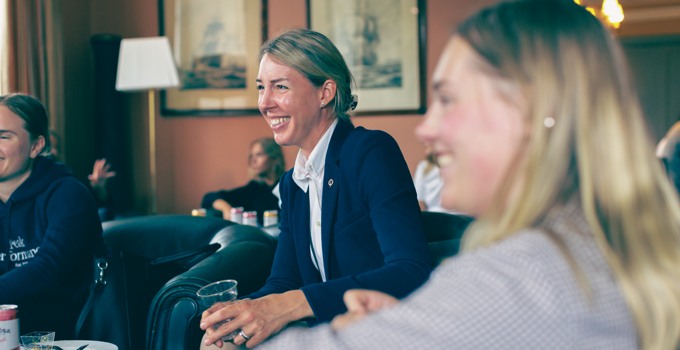
PhD programme in War Studies
The aim of the PhD programme in War Studies is to enable students to conduct high quality research in War Studies. The central task is to write an academic dissertation.
We offer a broad education in the theoretical and empirical core areas of War Studies as well as in various methods within the subject. The PhD programme has close ties with our research areas.
Four years of full-time study
The PhD programme consists of four years of full-time studies (240 ECTS credits). The central task is to write a doctoral thesis in War Studies under supervision (180 ECTS credits), but coursework (60 ECTS credits) is also part of the programme.
Doctoral position
As a PhD student at the Swedish Defence University you are employed as a university employee during your PhD studies. You will not have to pay any tuition fees, and you will receive salary, social security and an office space. Since you are a state employee, you are also entitled to several benefits and insurances.
The PhD student position is fully funded throughout the four years. The position may include teaching and other departmental duties up to 20 percent of full time if you and the department so wishes, resulting in the extension of the employment period for a corresponding length of time (to a maximum of five years in total).
Employment as a doctoral student at the Swedish Defence University entails a salary placement according to the current starting salary in the doctoral student scale, which is currently SEK 31,500 per month.
For doctoral students who are career officers with permanent employment at the Swedish Armed Forces, the conditions regulated in the Local Collective Agreement on Salary Setting for Military Doctoral Students apply. When employed as a doctoral student at the Swedish Defence University, career officers retain their basic salary.
Supervision
Each PhD student is assigned a main supervisor and a co-supervisor. Supervisors are appointed in consultation between the PhD student and the Director of Doctoral Studies after admission to the programme. This means that potential supervisors do not need to be contacted before applying. Admitting PhD students to the department is a faculty responsibility, and no single supervisor can admit students to the programme.
Courses
The first year includes four mandatory courses:
- War Studies: Theories, Development and Modern Research Debates (15 credits)
- Research Methods in the Study of War, Security and Crisis (15 credits)
- Ontologies of War (7.5 credits)
- Research in Sensitive Contexts: Ethics and Secrecy (7.5 credits)
The programme also includes 15 credits of elective courses, at the Swedish Defence University or other universities. Examples of elective courses in War Studies at the Swedish Defence University (may vary):
- Connectivity and Combat: War, the Media and the Contemporary Information Ecology
- Defence Strategies of the Nordic Countries
- Gender Security and War
- Militarism and Militarisation in the Study of War: Conceptual Debates (reading course)
- NATO: Organisation, Community, Actor
- Scholarly Debates in War Studies: Civil War and Military Interventions
- Scholarly Debates in War Studies: Critical War Studies
- Scholarly Debates in War Studies: Gender, Peace and Security
- Scholarly Debates in War Studies: Military Organisation and Profession
- Scholarly Debates in War Studies: Modern Warfare
- The Practice of Soldier-Scholars
- The Russo – Ukraine War: Multidisciplinary Perspectives
- War and Peace in International Order
- War’s Silent Legacy
- When War Comes to the City: Urban Wars and Urban Warfare
More information about current PhD courses
Dissertation
The dissertation can be written as a monograph (i.e. a cohesive book) or as a compilation thesis, including four articles/texts and an introductory chapter (so called kappa).
The PhD students are expected to present their dissertation work for the faculty on several occasions during their PhD programme. At the beginning of the second year, they have to present a plan for their thesis at the PM-seminar. During years two to four, they have to present their ongoing research at the regular War Studies seminar on at least two occasions. Finally, they have to present a complete thesis manuscript at the Manuscript Conference. Two of the professors or associate professors of the department decide when the manuscript is ready for public defence.
The PhD student plan their dissertation work together with their supervisors. The research often include field trips or other studies abroad. Students keep their salary during such research trips, and they also have access to a research budget of up to 30 000 SEK/year to cover costs for travel, literature and other research related costs. Additional expenses needs to be financed with external scholarships.
Public defence
The doctoral studies ends with a public defence of the PhD dissertation. An external opponent is invited to discuss the dissertation with the PhD student, which usually takes about two hours. Thereafter, the discussion is opened up for questions from the audience. When the discussion is over, a grading committee, including three professors or associate professors, decide if the dissertation passes or not.
More about the PhD programme and our research
Admission to the PhD programme in War Studies
Admission to the PhD Programme in War Studies occurs once a year. Open PhD student positions are announced at the end of May/early June every year, and the deadline for applications is usual...

Handbook for doctoral studies
Enrolment in a doctoral programme entails dedication to a research project that ultimately leads, under supervision, to a doctoral degree. The doctoral education includes courses and the wri...

Our research in War Studies
The war studies discipline at the Swedish Defence University focuses on the study of war, warfare, and military power. Research explores how military capability is developed, led, organised,...
%20(2)%20CJSE-7-org.jpg)
